17 apr 2019

The European Union’s foreign policy chief Federica Mogherini has once again expressed the 28-nation bloc’s disapproval of the Israeli regime’s claim of “sovereignty” to Syria’s Golan Heights and other Tel Aviv-occupied territories.
Speaking at the plenary session of the European Parliament, in the French city of Strasbourg, on Tuesday, Mogherini stressed that the EU’s position on the status of Golan “has not changed.”
“The EU has a very simple and clear position,” she said. “The EU does not recognize Israeli sovereignty over any of the territories occupied by Israel since June 1967, in line with international law and with UN Security Council Resolutions 242 and 497. And this also applies to the Golan Heights.”
The EU’s top diplomat also noted, according to the PNN, that she had already issued a declaration on behalf of all the 28 member states and clarified their stance on the Golan Heights.
Additionally, she said, the five EU member states of the UN Security Council – including the UK, France, Germany, Belgium and Poland – had expressed the bloc’s common position on Golan in a joint stake-out.
Israel seized the Golan Heights from Syria in the closing stages of its 1967 Six-Day War with Arab countries, which also saw the regime occupy the Palestinian territories of the West Bank, East Jerusalem al-Quds and the Gaza Strip.
Tel Aviv unilaterally annexed the Golan Heights in 1981, in a move not recognized internationally.
Syria has repeatedly reaffirmed its sovereignty over the Golan Heights, saying the territory must be completely restored to its control.
On March 25, US President Donald Trump signed a decree recognizing Israeli “sovereignty” over the occupied Golan at the start of a meeting with Israeli Prime Minister Benjamin Netanyahu, in Washington.
Trump’s controversial policy shift came over a year after the hawkish US president recognized Jerusalem al-Quds as the “capital” of Israel and transferred Washington’s embassy from Tel Aviv to the occupied Palestinian city.
Emboldened by Trump’s highly anti-Palestine agenda, Netanyahu has talked of plans to annex the occupied Palestinian region of the West Bank.
Illegal settlement activities
Elsewhere in her speech, Mogherini complained that Israel’s settlement construction activities in the occupied Palestinian lands were eroding any prospect of a two-state solution.
After a recent announcement by Israel to build 4,600 new settler units, the EU emphasized that it considered “all settlement activity illegal under international law, and that settlements erode the viability of the two-state solution,” she said.
“And in fact, the two-state solution is not only fading away. It is being dismantled piece by piece,” she added, warning that abandoning the solution would bring greater chaos, not only to the occupied territories but also to the entire Middle East.
Israel has over the past months stepped up its settlement construction activities in the occupied lands in defiance of United Nations Security Council Resolution 2334.
About 600,000 Israelis live in over 230 settlements built illegally since the 1967 occupation of the Palestinian lands.
Speaking at the plenary session of the European Parliament, in the French city of Strasbourg, on Tuesday, Mogherini stressed that the EU’s position on the status of Golan “has not changed.”
“The EU has a very simple and clear position,” she said. “The EU does not recognize Israeli sovereignty over any of the territories occupied by Israel since June 1967, in line with international law and with UN Security Council Resolutions 242 and 497. And this also applies to the Golan Heights.”
The EU’s top diplomat also noted, according to the PNN, that she had already issued a declaration on behalf of all the 28 member states and clarified their stance on the Golan Heights.
Additionally, she said, the five EU member states of the UN Security Council – including the UK, France, Germany, Belgium and Poland – had expressed the bloc’s common position on Golan in a joint stake-out.
Israel seized the Golan Heights from Syria in the closing stages of its 1967 Six-Day War with Arab countries, which also saw the regime occupy the Palestinian territories of the West Bank, East Jerusalem al-Quds and the Gaza Strip.
Tel Aviv unilaterally annexed the Golan Heights in 1981, in a move not recognized internationally.
Syria has repeatedly reaffirmed its sovereignty over the Golan Heights, saying the territory must be completely restored to its control.
On March 25, US President Donald Trump signed a decree recognizing Israeli “sovereignty” over the occupied Golan at the start of a meeting with Israeli Prime Minister Benjamin Netanyahu, in Washington.
Trump’s controversial policy shift came over a year after the hawkish US president recognized Jerusalem al-Quds as the “capital” of Israel and transferred Washington’s embassy from Tel Aviv to the occupied Palestinian city.
Emboldened by Trump’s highly anti-Palestine agenda, Netanyahu has talked of plans to annex the occupied Palestinian region of the West Bank.
Illegal settlement activities
Elsewhere in her speech, Mogherini complained that Israel’s settlement construction activities in the occupied Palestinian lands were eroding any prospect of a two-state solution.
After a recent announcement by Israel to build 4,600 new settler units, the EU emphasized that it considered “all settlement activity illegal under international law, and that settlements erode the viability of the two-state solution,” she said.
“And in fact, the two-state solution is not only fading away. It is being dismantled piece by piece,” she added, warning that abandoning the solution would bring greater chaos, not only to the occupied territories but also to the entire Middle East.
Israel has over the past months stepped up its settlement construction activities in the occupied lands in defiance of United Nations Security Council Resolution 2334.
About 600,000 Israelis live in over 230 settlements built illegally since the 1967 occupation of the Palestinian lands.
13 apr 2019
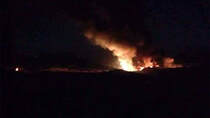
Syrian media report air defenses activated outside Hama; Syrian opposition claims strikes hit missile development center; Iranians killed, multiple wounded.
An airstrike on a military position in central Syria early Saturday wounded six soldiers and destroyed several buildings, Syria's state news agency SANA reported.
SANA quoted an unnamed military official as saying the airstrike near the town of Masyaf, in Hama province, hit a military academy widely known as the Accounting School. It said Israeli warplanes fired missiles toward Syria from Lebanon's airspace and that Syrian air defenses shot down some of the missiles.
The Britain-based Syrian Observatory for Human Rights said the Israeli airstrikes hit three targets, wounding 17 Syrian soldiers. It said there were also deaths, but it was not immediately clear how many were killed and whether they were Iranians or Iran-sponsored fighters. It said the strikes targeted the Accounting School as well as a missile development center in a village near Masyaf and a nearby military base run by Iran-backed fighters.
The Israeli military declined to comment. Israel does not usually comment on reports concerning its airstrikes in neighboring Syria, though it has recently acknowledged striking Iranian targets there. The last such strikes that Israel announced were in late March.
Iran is a close ally of Syrian President Bashar Assad and has sent military advisers, as well as thousands of fighters from across the region, to help his forces in the eight-year conflict.
Israel considers Iran its biggest threat and has said it will not tolerate an Iranian military presence on its borders.
The most serious wave of airstrikes on Syria this year occurred in January, when the Israeli military hit several Iranian targets, saying it was responding to an Iranian missile attack a day earlier. The Iranian launch followed a rare Israeli daylight air raid near the Damascus International Airport.
An airstrike on a military position in central Syria early Saturday wounded six soldiers and destroyed several buildings, Syria's state news agency SANA reported.
SANA quoted an unnamed military official as saying the airstrike near the town of Masyaf, in Hama province, hit a military academy widely known as the Accounting School. It said Israeli warplanes fired missiles toward Syria from Lebanon's airspace and that Syrian air defenses shot down some of the missiles.
The Britain-based Syrian Observatory for Human Rights said the Israeli airstrikes hit three targets, wounding 17 Syrian soldiers. It said there were also deaths, but it was not immediately clear how many were killed and whether they were Iranians or Iran-sponsored fighters. It said the strikes targeted the Accounting School as well as a missile development center in a village near Masyaf and a nearby military base run by Iran-backed fighters.
The Israeli military declined to comment. Israel does not usually comment on reports concerning its airstrikes in neighboring Syria, though it has recently acknowledged striking Iranian targets there. The last such strikes that Israel announced were in late March.
Iran is a close ally of Syrian President Bashar Assad and has sent military advisers, as well as thousands of fighters from across the region, to help his forces in the eight-year conflict.
Israel considers Iran its biggest threat and has said it will not tolerate an Iranian military presence on its borders.
The most serious wave of airstrikes on Syria this year occurred in January, when the Israeli military hit several Iranian targets, saying it was responding to an Iranian missile attack a day earlier. The Iranian launch followed a rare Israeli daylight air raid near the Damascus International Airport.
2 apr 2019
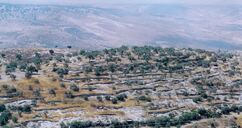
The Israeli government is planning to settle about 250,000 Israelis in the occupied Syrian Golan Heights, according to Israeli media sources on Monday.
The Israel Broadcasting Authority (IBA) said that the plan will be implemented over the next 30 years, coinciding with the 100th anniversary of the establishment of Israel.
According to the IBA, the Israeli plan, announced a week after the US administration's recognition of Israel's sovereignty over Golan, includes the construction of two new Jewish-only settlements in Golan along with thousands of housing units, and the launch of many transport and tourism projects.
The US president Donald Trump about a week ago signed a decree recognizing Israeli sovereignty over the Syrian Golan Heights.
Israel seized two thirds of Golan Heights during the 1967 Six-Day War and annexed it in 1981, a move that was never recognized by the international community.
The Israel Broadcasting Authority (IBA) said that the plan will be implemented over the next 30 years, coinciding with the 100th anniversary of the establishment of Israel.
According to the IBA, the Israeli plan, announced a week after the US administration's recognition of Israel's sovereignty over Golan, includes the construction of two new Jewish-only settlements in Golan along with thousands of housing units, and the launch of many transport and tourism projects.
The US president Donald Trump about a week ago signed a decree recognizing Israeli sovereignty over the Syrian Golan Heights.
Israel seized two thirds of Golan Heights during the 1967 Six-Day War and annexed it in 1981, a move that was never recognized by the international community.
28 mar 2019
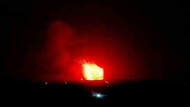
Syria Observatory for Human Rights says all of the fatatlities were Iran troops or militas linked to Tehran; FM Katz declines to confirm Israeli role in what he called a 'militarily challenging' operation
At least seven people were killed and five wounded in an overnight airstrike targeting Iranian weapons stores in Syria that was attributed to Israel, a monitoring group said Thursday.
According to the Syrian Observatory for Human Rights, all of the fatalities were members of the Iranian forces in Syria or militias linked to Tehran.
Acting Foreign Minister Yisrael Katz was reticent Thursday morning about directly acknowledging that Israel was behind the attack.
"According to foreign sources, the air force attacked Iranian troops in Syria," Katz told Ynet. "As far as Iran knows, it was us. It was an extremely challenging action from a military perspective."
In the wake of the airstrike, Israel decided Thursday morning to close its air space over the Golan Heights to all flights over 5,000 feet.
In January, Israel's Iron Dome missile defense system intercepted a rocket fired from Syria at the Golan Heights, close to the Hermon ski resort. The strike was later attributed to Iranian troops near the Israeli border.
Iran's growing influence in Syria, where it has struck economic and trade deals, has raised the prospect of a military confrontation with Israel.
Israel, which considers Iran its biggest threat, has repeatedly attacked Iranian targets in Syria and those of allied militia, including Hezbollah, an Iranian proxy based in Lebanon.
Prime Minister Benjamin Netanyahu has said Israel had carried out "hundreds" of attacks over the past few years of Syria's war to curtail Iran and its ally Hezbollah.
Israel has said it was crucial to block growing Iranian military influence in Syria and has vowed it would push its troops out of the country.
Iran has warned Israel it would respond if it continued attacking targets in Syria and repeatedly said its military presence in Syria is at the invitation of the Assad government and it has no immediate plans to withdraw.
The Syrian military said Wednesday night that the air raids on the industrial zone in the northern city of Aleppo were carried out by Israel, and caused damage only to materials, while opposition sources said the strikes hit Iranian ammunitions stores and a military airport used by Tehran's forces.
"The Israeli aggression targeted some positions in Sheikh Najjar industrial zone and a number of enemy missiles were brought down," an army statement said.
The state-run Syrian news agency Sana said that the country's air defenses were "in operation" over Aleppo and claimed that they had brought down 70 percent of their targets.
The strike reportedly took place while the United Nations Security Council was discussing the US recognition over Israeli sovereignty over the Golan Heights.
There was no immediate comment from Israel.
At least seven people were killed and five wounded in an overnight airstrike targeting Iranian weapons stores in Syria that was attributed to Israel, a monitoring group said Thursday.
According to the Syrian Observatory for Human Rights, all of the fatalities were members of the Iranian forces in Syria or militias linked to Tehran.
Acting Foreign Minister Yisrael Katz was reticent Thursday morning about directly acknowledging that Israel was behind the attack.
"According to foreign sources, the air force attacked Iranian troops in Syria," Katz told Ynet. "As far as Iran knows, it was us. It was an extremely challenging action from a military perspective."
In the wake of the airstrike, Israel decided Thursday morning to close its air space over the Golan Heights to all flights over 5,000 feet.
In January, Israel's Iron Dome missile defense system intercepted a rocket fired from Syria at the Golan Heights, close to the Hermon ski resort. The strike was later attributed to Iranian troops near the Israeli border.
Iran's growing influence in Syria, where it has struck economic and trade deals, has raised the prospect of a military confrontation with Israel.
Israel, which considers Iran its biggest threat, has repeatedly attacked Iranian targets in Syria and those of allied militia, including Hezbollah, an Iranian proxy based in Lebanon.
Prime Minister Benjamin Netanyahu has said Israel had carried out "hundreds" of attacks over the past few years of Syria's war to curtail Iran and its ally Hezbollah.
Israel has said it was crucial to block growing Iranian military influence in Syria and has vowed it would push its troops out of the country.
Iran has warned Israel it would respond if it continued attacking targets in Syria and repeatedly said its military presence in Syria is at the invitation of the Assad government and it has no immediate plans to withdraw.
The Syrian military said Wednesday night that the air raids on the industrial zone in the northern city of Aleppo were carried out by Israel, and caused damage only to materials, while opposition sources said the strikes hit Iranian ammunitions stores and a military airport used by Tehran's forces.
"The Israeli aggression targeted some positions in Sheikh Najjar industrial zone and a number of enemy missiles were brought down," an army statement said.
The state-run Syrian news agency Sana said that the country's air defenses were "in operation" over Aleppo and claimed that they had brought down 70 percent of their targets.
The strike reportedly took place while the United Nations Security Council was discussing the US recognition over Israeli sovereignty over the Golan Heights.
There was no immediate comment from Israel.
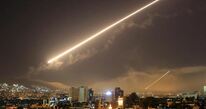
The Syrian army said Israel on Wednesday night launched aerial attacks on the industrial zone and airport in the northern city of Aleppo, causing only material damage.
The Israeli aggression targeted some positions in Sheikh Najjar industrial zone and Aleppo airport, and 70 percent of the enemy missiles were brought down, according to a Syrian military statement.
The blasts caused an electrical blackout in Aleppo, the country's second largest city and a major industrial hub.
The strikes coincided with an emergency meeting of the UN Security Council that was held at Syria's request over US president Donald Trump's recognition of Israeli sovereignty over the occupied Golan Heights.
Report: Israel strikes Iran weapons stores in Syria
Opposition sources familiar with Tehran's military presence in Aleppo area say large ammunitions depot and a logistics hub belonging to Iranian-backed militias inside local industrial zone received direct hits
The Syrian military said Israel on Wednesday night launched raids on an industrial zone in the northern city of Aleppo, causing damage only to materials, while opposition sources said the strikes hit Iranian ammunitions stores and a military airport used by Tehran's forces.
"The Israeli aggression targeted some positions in Sheikh Najjar industrial zone and a number of enemy missiles were brought down," an army statement said.
The state-run Syrian news agency Sana said that the country's air defenses were "in operation" over Aleppo and claimed that they had brought down 70 percent of their targets.
The strike reportedly took place while the United Nations Security Council was discussing the US recognition over Israeli sovereignty over the Golan Heights.
There was no immediate comment from Israel.
The blasts caused an electrical blackout in Aleppo, the country's second largest city and a major industrial hub that bore the brunt of years of fighting and heavy Russian and Syrian aerial bombardment on its former rebel-held areas.
Military experts say Aleppo is one of the main areas where Iran's elite Revolutionary Guards have a strong military presence supporting local militias that have for years been fighting alongside the Syrian army to defeat insurgents.
Two opposition sources familiar with Tehran's military presence in the area said large ammunitions depot and a logistics hub that belonged to Iranian-backed militias inside the industrial zone received direct hits.
Other strikes hit the vicinity of Nairab military airport on the outskirts of Aleppo in the second such strike on the installation used by Iranian troops in less than a year, they added.
Iranian-backed Shiite militias have expanded their control over mainly Sunni areas around Damascus, southern and eastern Syria that bore the brunt of the heaviest bombardment and led to mass displacement or emigration to neighbouring countries.
Iran's growing influence in Syria, where it has struck economic and trade deals, has raised the prospect of a military confrontation with Israel.
Israel, which considers Iran its biggest threat, has repeatedly attacked Iranian targets in Syria and those of allied militia, including Lebanon's Hezbollah.
Earlier this year the IDF said they had attacked Iranian targets that included munitions stores in Damascus International Airport.
Prime Minister Benjamin Netanyahu has said Israel had carried out "hundreds" of attacks over the past few years of Syria's war to curtail Iran and its ally Hezbollah.
Israel has said it was crucial to block growing Iranian military influence in Syria and has vowed it would push its troops out of the country.
Iran has warned Israel it would respond if it continued attacking targets in Syria and repeatedly said its military presence in Syria is at the invitation of the Assad government and it has no immediate plans to withdraw.
The Israeli aggression targeted some positions in Sheikh Najjar industrial zone and Aleppo airport, and 70 percent of the enemy missiles were brought down, according to a Syrian military statement.
The blasts caused an electrical blackout in Aleppo, the country's second largest city and a major industrial hub.
The strikes coincided with an emergency meeting of the UN Security Council that was held at Syria's request over US president Donald Trump's recognition of Israeli sovereignty over the occupied Golan Heights.
Report: Israel strikes Iran weapons stores in Syria
Opposition sources familiar with Tehran's military presence in Aleppo area say large ammunitions depot and a logistics hub belonging to Iranian-backed militias inside local industrial zone received direct hits
The Syrian military said Israel on Wednesday night launched raids on an industrial zone in the northern city of Aleppo, causing damage only to materials, while opposition sources said the strikes hit Iranian ammunitions stores and a military airport used by Tehran's forces.
"The Israeli aggression targeted some positions in Sheikh Najjar industrial zone and a number of enemy missiles were brought down," an army statement said.
The state-run Syrian news agency Sana said that the country's air defenses were "in operation" over Aleppo and claimed that they had brought down 70 percent of their targets.
The strike reportedly took place while the United Nations Security Council was discussing the US recognition over Israeli sovereignty over the Golan Heights.
There was no immediate comment from Israel.
The blasts caused an electrical blackout in Aleppo, the country's second largest city and a major industrial hub that bore the brunt of years of fighting and heavy Russian and Syrian aerial bombardment on its former rebel-held areas.
Military experts say Aleppo is one of the main areas where Iran's elite Revolutionary Guards have a strong military presence supporting local militias that have for years been fighting alongside the Syrian army to defeat insurgents.
Two opposition sources familiar with Tehran's military presence in the area said large ammunitions depot and a logistics hub that belonged to Iranian-backed militias inside the industrial zone received direct hits.
Other strikes hit the vicinity of Nairab military airport on the outskirts of Aleppo in the second such strike on the installation used by Iranian troops in less than a year, they added.
Iranian-backed Shiite militias have expanded their control over mainly Sunni areas around Damascus, southern and eastern Syria that bore the brunt of the heaviest bombardment and led to mass displacement or emigration to neighbouring countries.
Iran's growing influence in Syria, where it has struck economic and trade deals, has raised the prospect of a military confrontation with Israel.
Israel, which considers Iran its biggest threat, has repeatedly attacked Iranian targets in Syria and those of allied militia, including Lebanon's Hezbollah.
Earlier this year the IDF said they had attacked Iranian targets that included munitions stores in Damascus International Airport.
Prime Minister Benjamin Netanyahu has said Israel had carried out "hundreds" of attacks over the past few years of Syria's war to curtail Iran and its ally Hezbollah.
Israel has said it was crucial to block growing Iranian military influence in Syria and has vowed it would push its troops out of the country.
Iran has warned Israel it would respond if it continued attacking targets in Syria and repeatedly said its military presence in Syria is at the invitation of the Assad government and it has no immediate plans to withdraw.
27 mar 2019
|
|
Syria's ambassador to the United Nations has lashed out at US President Donald Trump's recognition of “Israeli sovereignty” over the occupied Golan Heights, describing the move as part of a “criminal project” aimed at prolonging chaos and destruction in the region.
Bashar Jaafari made the remarks at a Wednesday UN Security Council meeting on the situation of Syria in the wake of Trump’s Monday decision to recognize “Israeli sovereignty” over the Syrian territories of Golan Heights. “This is a criminal project or plan for which the US government and its allies have used all tools at their disposal,” Jaafari said, adding that the plan is aimed at guaranteeing chaos and destruction in the region, and dividing the people of the region on religious and ethnic basis in order to “build a new reality”. |
“From the first day of this terrorist war led by governments of certain known countries, we said that the main goal of this war was to ensure Israeli occupation of Arab territories and to ensure that the occupation can go on forever on the basis of the plan put forward by the United States,” he said.
The US president’s recent decision on the occupied Golan Heights “shows just how correct we were at the time,” the Syrian envoy added.
Trump signed a decree recognizing Israeli “sovereignty” over the occupied Golan at the start of a meeting with Israeli Prime Minister Benjamin Netanyahu in Washington on Monday.
Since then, the US has become the subject of a new round of furor by world countries over Trump’s controversial decision.
Iran, Turkey, Lebanon, Russia, and the European Union were quick to reject Trump’s move, which is in obvious contravention of international law.
In a declaration issued on Wednesday, EU foreign policy chief Federica Mogherini's office announced that the bloc "does not recognize Israeli sovereignty over the occupied Golan Heights.”
Security Council rejects Trump’s decision
The Wednesday meeting of the Security Council turned into another stage for the isolation of the US, as other countries on the council opposed Trump’s move on the occupied Golan Heights.
British UN Ambassador Karen Pierce told the council that the US decision was in contravention of that 1981 resolution, which declared "null and void and without international legal effect” the Israeli annexation of Golan in 1981.
Russia's Deputy UN Ambassador Vladimir Safronkov said Washington had violated UN resolutions and warned it could fuel instability in the Middle East.
North Korea also issued a statement backing "the struggle of the Syrian government and people for taking back the occupied Golan Heights."
The European members of the council - France, Britain, Germany, Belgium and Poland - had earlier on Tuesday raised concerns about "broader consequences of recognizing illegal annexation and also about the broader regional consequences."
Back on Thursday, Trump tweeted that it was time to back Israeli “sovereignty” over the Golan Heights, a Syrian territory under Israeli occupation since the 1967 Six-Day War.
"After 52 years it is time for the United States to fully recognize Israel’s Sovereignty over the Golan Heights, which is of critical strategic and security importance to the State of Israel and Regional Stability!" the US president wrote on Twitter.
In 1967, Israel waged a full-scale war against Arab territories during which it occupied a large swathe of Syria’s Golan and annexed it four years later, a move never recognized by the international community.
Syria has repeatedly reaffirmed its sovereignty over the Golan Heights, saying the territory must be completely restored to its control.
The US president’s recent decision on the occupied Golan Heights “shows just how correct we were at the time,” the Syrian envoy added.
Trump signed a decree recognizing Israeli “sovereignty” over the occupied Golan at the start of a meeting with Israeli Prime Minister Benjamin Netanyahu in Washington on Monday.
Since then, the US has become the subject of a new round of furor by world countries over Trump’s controversial decision.
Iran, Turkey, Lebanon, Russia, and the European Union were quick to reject Trump’s move, which is in obvious contravention of international law.
In a declaration issued on Wednesday, EU foreign policy chief Federica Mogherini's office announced that the bloc "does not recognize Israeli sovereignty over the occupied Golan Heights.”
Security Council rejects Trump’s decision
The Wednesday meeting of the Security Council turned into another stage for the isolation of the US, as other countries on the council opposed Trump’s move on the occupied Golan Heights.
British UN Ambassador Karen Pierce told the council that the US decision was in contravention of that 1981 resolution, which declared "null and void and without international legal effect” the Israeli annexation of Golan in 1981.
Russia's Deputy UN Ambassador Vladimir Safronkov said Washington had violated UN resolutions and warned it could fuel instability in the Middle East.
North Korea also issued a statement backing "the struggle of the Syrian government and people for taking back the occupied Golan Heights."
The European members of the council - France, Britain, Germany, Belgium and Poland - had earlier on Tuesday raised concerns about "broader consequences of recognizing illegal annexation and also about the broader regional consequences."
Back on Thursday, Trump tweeted that it was time to back Israeli “sovereignty” over the Golan Heights, a Syrian territory under Israeli occupation since the 1967 Six-Day War.
"After 52 years it is time for the United States to fully recognize Israel’s Sovereignty over the Golan Heights, which is of critical strategic and security importance to the State of Israel and Regional Stability!" the US president wrote on Twitter.
In 1967, Israel waged a full-scale war against Arab territories during which it occupied a large swathe of Syria’s Golan and annexed it four years later, a move never recognized by the international community.
Syria has repeatedly reaffirmed its sovereignty over the Golan Heights, saying the territory must be completely restored to its control.
26 mar 2019
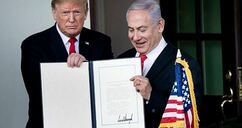
US president Donald Trump on Monday evening signed a decree recognizing Israeli sovereignty over the occupied Golan Heights, seized from Syria in 1967, in a move that received widespread international condemnation.
Benjamin Netanyahu, who faces an election next month, was by Trump's side as he signed the proclamation at the White House.
Israel annexed the Golan Heights in 1981, in a move that is not recognized by the international community.
"Today, I am taking historic action to promote Israel's ability to defend itself and really to have a very powerful, very strong national security, which they're entitled to have," Trump told a news conference before signing the measure.
Syria denounced Trump's decision as "a blatant attack on its sovereignty” and vowed to recover the area "through all available means.”
The Hamas Movement, for its part, deplored the US decision on the Syrian Golan Heights as “a gross alignment with Israel against the Arab rights” and said that such move vindicated further that “the administration of Trump has become a threat to international peace and security.”
Benjamin Netanyahu, who faces an election next month, was by Trump's side as he signed the proclamation at the White House.
Israel annexed the Golan Heights in 1981, in a move that is not recognized by the international community.
"Today, I am taking historic action to promote Israel's ability to defend itself and really to have a very powerful, very strong national security, which they're entitled to have," Trump told a news conference before signing the measure.
Syria denounced Trump's decision as "a blatant attack on its sovereignty” and vowed to recover the area "through all available means.”
The Hamas Movement, for its part, deplored the US decision on the Syrian Golan Heights as “a gross alignment with Israel against the Arab rights” and said that such move vindicated further that “the administration of Trump has become a threat to international peace and security.”
22 mar 2019

The Hamas Movement has voiced its rejection of the US administration’s intent to recognize Israeli sovereignty over the occupied Syrian Golan Heights, describing such decision as “another assault on the Arab nation.”
In a press release, Hamas spokesman Sami Abu Zuhri said that US president Donald Trump’s stated intent to recognize Israeli sovereignty over the Israeli occupied Golan Heights “is reprehensible and violates international laws and resolutions.”
In another statement, Hamas described such US decision as persistence in assaulting the Arab rights and a gross bias in favor of Israel.
In a press release, Hamas spokesman Sami Abu Zuhri said that US president Donald Trump’s stated intent to recognize Israeli sovereignty over the Israeli occupied Golan Heights “is reprehensible and violates international laws and resolutions.”
In another statement, Hamas described such US decision as persistence in assaulting the Arab rights and a gross bias in favor of Israel.
21 mar 2019
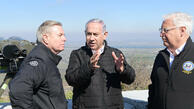
L-R: Lindsey Graham, Benjamin Netanyahu and David Friedman
Tweet from president comes as Pompeo and Netanyahu prepared to give joint address in Jerusalem; also follows series of hints that the decision was imminent, such as changing status of plateau in annual human rights report
It is time for the US to "fully recognize" Israeli sovereignty on the Golan Heights, US President Donald Trump said Thursday in a Twitter message that confirmed a shift in American foreign policy hinted at for several weeks.
"After 52 years it is time for the United States to fully recognize Israel’s (s)overeignty over the Golan Heights, which is of critical strategic and security importance to the State of Israel and Regional Stability!" Trump posted, as his secretary of state Mike Pompeo prepared to deliver a joint address from Jerusalem with Prime Minister Benjamin Netanyahu.
The tweet came less than a day after Israeli and American officials said they expected an announcement on the issue as soon as next week, when Prime Minister Benjamin Netanyahu visits Washington.
The officials spoke on condition of anonymity because the information had not yet been made public.
Netanyahu thanked the US president for his decision to "boldly recognize Israeli sovereignty over the Golan Heights," on his official Twitter page
Netanyahu also said that the Golan was a buffer to keep Israel's enemies at bay, in particular Iran.
“You could imagine what would have happened if Israel were not in the Golan,” he said. “You would have Iran on the shores of the Sea of Galilee.”
While Pompeo avoided the issue of sovereignty over the Golan during his visit to Israel on Wednesday, he lauded the White House’s warm ties with the Jewish state and promised to step up pressure on Iran, giving a public boost to Netanyahu at the height of a tight re-election campaign.
A change in the US view of Israeli sovereignty over the Golan Heights, which it captured from Syria in the 1967 Six-Day War, along with the West Bank from Jordan and the Gaza Strip from Egypt, was also hinted at last week when the State Department changed its usual description of the plateau from "Israeli-occupied" to "Israeli-controlled" in an annual global human rights report.
A separate section of the report on the West Bank and Gaza Strip also did not refer to those territories as being "occupied" or under "occupation."
Republican Senator Lindsey Graham earlier this month also vowed to push for the US to recognize Israeli sovereignty over the Golan Heights.
The South Carolina politican made his pledge during a tour of the frontier with Netanyahu and US Ambassador to Israel David Friedman.
“The Golan is not disputed. It is in the hands of Israel and will always remain in the hands of Israel,” Graham said from a cliff overlooking Syria, where Syrian flags could be seen fluttering in the distance on buildings damaged in the country’s civil war.
“My goal is to try to explain this to the administration,” he said.
Tweet from president comes as Pompeo and Netanyahu prepared to give joint address in Jerusalem; also follows series of hints that the decision was imminent, such as changing status of plateau in annual human rights report
It is time for the US to "fully recognize" Israeli sovereignty on the Golan Heights, US President Donald Trump said Thursday in a Twitter message that confirmed a shift in American foreign policy hinted at for several weeks.
"After 52 years it is time for the United States to fully recognize Israel’s (s)overeignty over the Golan Heights, which is of critical strategic and security importance to the State of Israel and Regional Stability!" Trump posted, as his secretary of state Mike Pompeo prepared to deliver a joint address from Jerusalem with Prime Minister Benjamin Netanyahu.
The tweet came less than a day after Israeli and American officials said they expected an announcement on the issue as soon as next week, when Prime Minister Benjamin Netanyahu visits Washington.
The officials spoke on condition of anonymity because the information had not yet been made public.
Netanyahu thanked the US president for his decision to "boldly recognize Israeli sovereignty over the Golan Heights," on his official Twitter page
Netanyahu also said that the Golan was a buffer to keep Israel's enemies at bay, in particular Iran.
“You could imagine what would have happened if Israel were not in the Golan,” he said. “You would have Iran on the shores of the Sea of Galilee.”
While Pompeo avoided the issue of sovereignty over the Golan during his visit to Israel on Wednesday, he lauded the White House’s warm ties with the Jewish state and promised to step up pressure on Iran, giving a public boost to Netanyahu at the height of a tight re-election campaign.
A change in the US view of Israeli sovereignty over the Golan Heights, which it captured from Syria in the 1967 Six-Day War, along with the West Bank from Jordan and the Gaza Strip from Egypt, was also hinted at last week when the State Department changed its usual description of the plateau from "Israeli-occupied" to "Israeli-controlled" in an annual global human rights report.
A separate section of the report on the West Bank and Gaza Strip also did not refer to those territories as being "occupied" or under "occupation."
Republican Senator Lindsey Graham earlier this month also vowed to push for the US to recognize Israeli sovereignty over the Golan Heights.
The South Carolina politican made his pledge during a tour of the frontier with Netanyahu and US Ambassador to Israel David Friedman.
“The Golan is not disputed. It is in the hands of Israel and will always remain in the hands of Israel,” Graham said from a cliff overlooking Syria, where Syrian flags could be seen fluttering in the distance on buildings damaged in the country’s civil war.
“My goal is to try to explain this to the administration,” he said.
